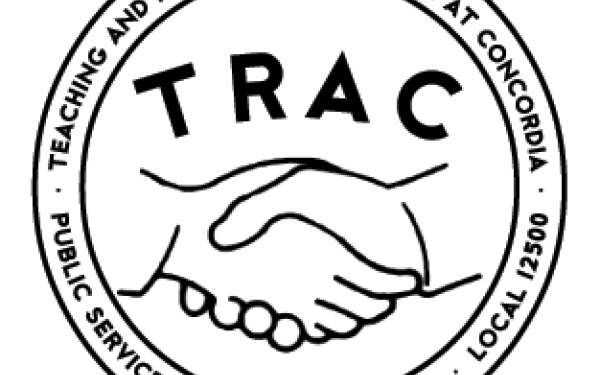TRAC Off Track
Union Will Remain Without Executive Until Heard by National Body
Internal fighting is threatening to derail Concordia’s teaching assistants’ bargaining power with the university.
A general assembly was presented with an investigative report denouncing its union’s executive committee and the majority voted to reject the recommendations made in the report Monday night.
Those that attended the meeting were unable to suggest new recommendations and could not adopt only part of the report.
Executives of the Teaching and Research Assistants at Concordia union were removed from their posts two weeks ago after an independent report called them “fully dysfunctional.” The report was conducted by the Public Service Alliance of Canada, the union’s parent organization.
The meeting was closed to non-TRAC members. The union’s recently dismissed president, Nader Jafari Nodoushan, could not be reached for comment.
“I don’t think anyone in this room knew more than what was in the report,” said suspended communications executive Robert Sonin.
“This is my final term and it’s a hell of a way to end five years at a union, with this just total destruction,” Sonin told The Link. “We’re in a terrible position for bargaining, because the union is just not being run properly.”
Some of the accusations in the report are directed at Sonin, whose eligibility was questioned many times during the meeting. These questions were ultimately shot down since he has continued to pay TRAC dues since his initial TA-ship in 2009.
A mere formality, the vote will have little influence on the future approval of the report by PSAC’s national board. Still, for some members in attendance, such as Student Association for Graduates in English co-president Alanna Bartolini, the outcome was “unfortunate.”
“This is my final term and it’s a hell of a way to end five years at a union, with this just total destruction.” —Robert Sonin, suspended Communications and Mobilization Executive Officer for TRAC
According to Bartolini, the assembly was poorly advertised and many TAs from the English department were not aware of the event. PSAC also prevented publicizing the report, which resulted in a popularity contest, she said.
“It’s difficult when they lock the reports so no one can read it and then they expect people to come in and be prepared to vote on it,” she added.
“They’re not advertising the report because they don’t want Concordia to think we aren’t credible or capable of managing our own affairs—when in fact we are and we’re handling it,” Bartolini continued. “I think if anything it shows we’re able to clean house when we need to.”
The union doesn’t want in-house turmoil to taint negotiations with the university.
According to Bartolini, there’s too much incompetence within the executive board and all members should be removed and a re-election should be held, as the report also suggested.
“It’s one thing to have a little dead weight on a committee,” she said, regarding the current situation. “It’s another thing to have cement blocks on your feet dragging you to the ocean floor.”
The report, the product of a four-month investigation, was published online before PSAC sent out cease and desist letters.
The investigation concluded that Nodoushan intimidated and interfered with the work of some executive officers—but that his actions were not based on “ill-will.”
The report also questions the hours claimed by Nodoushan, which “are the most numerous, by far, with little to no explanation.”
The executive appeared to be divided between Vice-President Daria Saryan, Bargaining Officer Isabelle Johnston and Sonin and Grievance Officer Gounash Pirnya and Nodoushan.
There were unsubstantiated accusations of racism in the report from Nodoushan toward Saryan, who felt harassed after meeting with Concordia human resources. It also concluded Nodoushan spent $3000 on mugs without authorization.
PSAC will also be in charge of training new executives, after the investigation found some officers were ill-equipped for their positions.
The report suggests barring Nodoushan from running for president again as “he has proven that he does not understand the role of a President.”
In fact, when asked by investigators, each executive said they would not be able to work with each other.
The report will be put to a vote at the regional Quebec council next week and then to the national board of directors.
A new team should be elected at the beginning of March—only a month away from annual elections. It’s uncertain whether TRAC will have to vote a second time during the annual election period.
PSAC refuses to comment.
Corrections: The nature of the vote has been clarified at the beginning of the article. Also, the original version of this article said Sonin was no longer a student: he is in fact currently enrolled full-time. The Link regrets the error.

_900_597_90.jpg)


_600_375_90_s_c1.jpg)
_600_375_90_s_c1.jpg)

_600_375_90_s_c1.jpg)